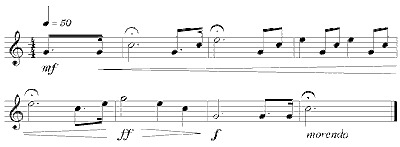Taps Bugle Call 64Kbps MP3 488 kb, Taps Bugle Call VBR MP3 977 kb, Taps Bugle Call OGG format 650 kb which is a free, open standard container format maintained by the Xiph.Org Foundation. The OGG format is unrestricted by software patents and is designed to provide for efficient streaming and manipulation of high quality digital multimedia.
Taps signals that unauthorized lights are to be extinguished. This is the last call of the day. The call is also sounded at the completion of a military funeral ceremony.
Composition Licence: This Image (or other media file) is in the public domain because its copyright has expired. This applies to the United States, where Works published prior to 1978 were copyright protected for a maximum of 75 years. See Circular 1 "COPYRIGHT BASICS" PDF from the U.S. Copyright Office. Works published before 1923, in this case 1862, are now in the public domain and also in countries that figure copyright from the date of death of the artist (post mortem auctoris) in this case Daniel Adams Butterfield (October 31, 1831 – July 17, 1901) and that most commonly run for a period of 50 to 70 years from December 31 of that tear.
Performance Licence: U.S. Army Bands Online (ABO) is provided as a public service by the Chief of Army Bands.
Unless specified otherwise, information presented on ABO is considered public information and may be distributed or copied. Use of appropriate byline/photo/image credits is requested.
This file is a work of a Soldier or employee of the United States Army, taken or made during the course of the person's official duties. As a work of the U.S. federal government, the file is in the public domain
Generally speaking, works created by U.S. Government employees are not eligible for copyright protection in the United States. See Circular 1 "COPYRIGHT BASICS" PDF from the U.S. Copyright Office.
Of all the military bugle calls, none is so easily recognized or more apt to render emotion than Taps. Up to the Civil War, the traditional call at day's end was a tune, borrowed from the French, called Lights Out. In July of 1862, in the aftermath of the bloody Seven Days battles, hard on the loss of 600 men and wounded himself, Union General Daniel Adams Butterfield called the brigade bugler to his tent. He thought "Lights Out" was too formal and he wished to honor his men. Oliver Wilcox Norton, the bugler, tells the story, "...showing me some notes on a staff written in pencil on the back of an envelope, (he) asked me to sound them on my bugle.
I did this several times, playing the music as written. He changed it somewhat, lengthening some notes and shortening others, but retaining the melody as he first gave it to me. After getting it to his satisfaction, he directed me to sound that call for Taps thereafter in place of the regulation call. The music was beautiful on that still summer night and was heard far beyond the limits of our Brigade. The next day I was visited by several buglers from neighboring Brigades, asking for copies of the music which I gladly furnished. The call was gradually taken up through the Army of the Potomac."
This more emotive and powerful Taps was soon adopted throughout the military. In 1874 It was officially recognized by the U.S. Army. It became standard at military funeral ceremonies in 1891. There is something singularly beautiful and appropriate in the music of this wonderful call. Its strains are melancholy, yet full of rest and peace. Its echoes linger in the heart long after its tones have ceased to vibrate in the air.
- from an article by Master Sergeant Jari A Villanueva, USAF.
Author: U.S. Army Bands
Keywords: Taps; Bugle Call; U.S. Army Bands; military funeral ceremony
Creative Commons license: Public Domain















